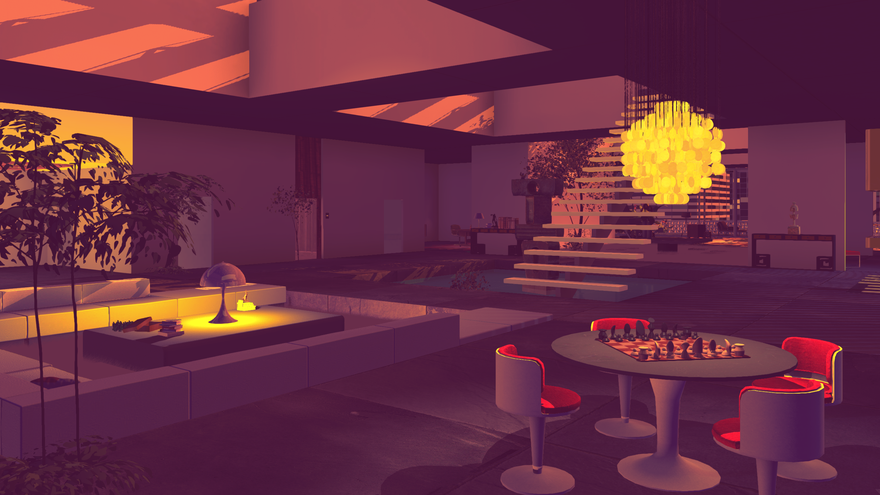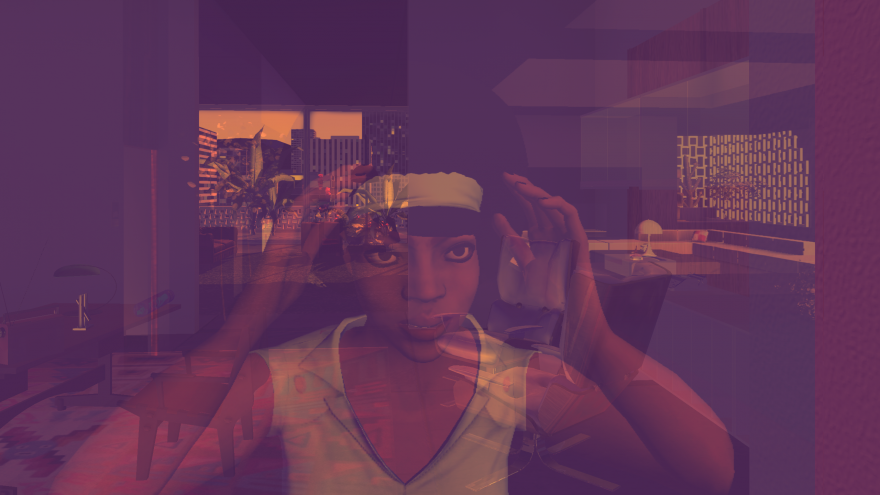Tale of Tale’s upcoming game Sunset has beguiled us since we first saw it—a vision altogether more assured, colorful and inviting than the vast majority of games we come across. Last week, when the first real look at the game arrived in the form of screenshots, we took the opportunity to discuss the game a little further with the creators.
Gaming’s favorite (and only) Belgian power-couple, Auriea Harvey and Michaël Samyn, first began thinking of what would eventually become Sunset years ago. Inspired by films like Wong Kar Wai’s Chungking Express, they envisioned an exploration of romance through space, in a relationship between a cleaning lady and the apartment’s inhabitant. But as time went on and the game evolved, their focus turned from pure romance to a more pressing issue.

“How do you get on with your day-to-day while living in a world or atmosphere filled with violence?” Auriea asks. “I think we’re all experiencing that to some degree now, with the constant wars, terrorism, everyday another bombing, another shooting. Michaël and I at least feel this need to step back, to think about what it all means and how to deal with it. We thought if we needed an experience like that, maybe other people did too. And since games can be such a great tool for examining the world around us, maybe something like Sunset could be an opportunity to explore that atmosphere in a controlled environment.”
Sunset follows the story of Angela Burnes, who emigrates from the revolutionary climate of 1970’s America and into the revolution of a war-torn South American country. As the housekeeper of the highly cultured (perhaps even pretentious) native to the country, Gabriel Ortega, your relationship to both your employer and his country develops through how you choose to interact with his apartment.
“A lot of Tale of Tales games has ourselves in it,” Auriea explains. “In this case, my experience of being an American expatriate is definitely part of Sunset. I want to give people that experience: of at first feeling completely alien to a city, and then eventually developing a sense of place there, a real stake in your new country.”
To an extent, the expatriate experience mimics that of a player entering a game world: at first a tourist, curious to discover more about this unfamiliar territory, before eventually feeling so at home that the foreign becomes the mundane. Tale of Tales says they’re emphasizing this particular experience through the player’s inhabitation of Angela herself as a character. “You’re in her skin, of course, because she’s your avatar,” Auriea explains. “But at the same time, you’re seeing her around in the scenery, reflected in the mirrors, water, glass. So in a way, you’re looking at her—but the more you become a part of the story through your choices, the more that reflection becomes you, too.”
The decisions you make in Sunset may seem small initially, like picking which tasks you carry out in a day. But as the temptation to snoop grows, and you come into contact with important documents and information: “Things start to become more grey as you come to realize who you’re working for, what’s going on in the country, and how you might be able to affect it.” The objects transform throughout your journey, corresponding with changes to Ortega’s character. As his interests turn from snobby artwork to relics of his country’s indigenous past, you also begin to learn more about Anchuria’s origins. While the choices you make won’t necessarily lead to different endings, the difference lies in the emotional paths you lean toward throughout the game. In a backdrop of war, do you become the lover, or fighter; traitor, or friend?

Tale of Tales meticulously researched the modernist architecture movement of the era. Aside from providing a setting of political upheaval, Auriea says the time period also allows the player “to experience a moment in history when revolutions weren’t only associated with terrorism and dirty politics. In the story, the dictator is backed by major super powers (as many dictatorships were in the 70’s), so we get to have this sort of heroic Che Guevara-esque revolution, speaking up on behalf of the people. Whether that eventually turns out well or not, you don’t know. But I’m someone that believes people should think of revolution as a good thing.”
Known as Los Yuagaras, the revolutionaries of Anchuria hail from a region with the same animal-inspired namesake. Designing the rebel group’s graffiti tags and symbolism has been one of Auriea’s favorite aspects of the process. “Even though you won’t see any of it in the actual game, we know everything about Los Yuagaras: the exact location of their hiding spot in the hills, the names of each and every one of their leaders, where their supporters are on the map.”

Tale of Tales admits that their thoughts have been dominated by an obsession with sunsets ever since they used the aesthetic in Bientot L’ete. But they also saw the time of day as befitting symbolism for the beginning of Angela’s work day. “Sunsets reflect this sort of violence, because they can look rather fiery,” Auriea says. “We thought it mimicked the bombs that fall, the passion you might develop for Ortega, the passion Ortega harbors for his country—the passion of the people out there fighting.”
Keep watching the Sunset website for more updates and tidbits on the story in the months leading up to its planned release in March.



